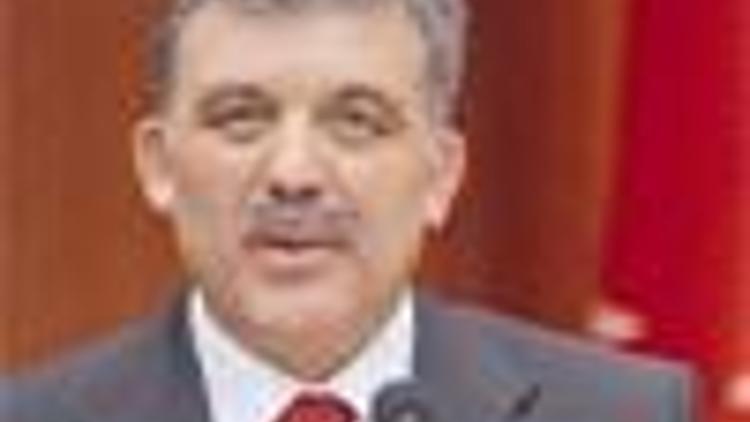President should stand trial: Court
Güncelleme Tarihi:

Hürriyet Daily News
Oluşturulma Tarihi: Mayıs 19, 2009 09:39
ANKARA - An Ankara court rules that President Abdullah Gül should stand trial in a corruption case involving millions of dollars of missing funds from the Welfare Party. Legal experts, but, are divided over whether Gül can face trial
The controversy over President Abdullah Gül standing trial in a fraud case continues, with an Ankara court yesterday ruling Gül should be tried.
The Ankara Public Prosecutor's Office had earlier ruled for the dismissal of legal proceedings against Gül over the case publicly known as "the missing trillions." But yesterday the Sincan High Criminal Court yesterday ruled that Gül should stand trial in the a corruption case involving millions of dollars of missing funds from the Welfare Party, or RP, the founder and leader of which is former Prime Minister Necmettin Erbakan.
Gül, a cofounder of the ruling Justice and Development Party, or AKP, was elected president in 2007. The fraud case dates back to the late 1990s, when the Islamic-rooted RP, a predecessor to the AKP, was accused of misappropriating funds from the Treasury.
Several executives of the banned RP, of which Gül was the deputy chairman at the time, were convicted of falsifying party records and hiding millions of dollars in cash reserves ordered seized after the party was shut down in 1997. As President, Gül currently enjoys immunity.
Erbakan was found guilty five years ago in the same fraud case. Gül, who served as minister under Erbakan with the RP, pardoned Erbakan in 2008 because of his health problems.
Legal experts, meanwhile, split into two on whether Gül could be judged or not. Speaking to the private NTV television channel yesterday, former Justice Minister Hikmet Sami Türk said Gül currently enjoys immunity and there were no legal arrangements in the 1961 and 1982 Constitutions on whether an active president can be judged.
Legal experts split
Türk said Gül could only be judged after his tenure ends. But the legal process will continue after Gül’s term ends, regardless of how much time has passed.
Recalling a similar case concerning the former French President Jacques Chirac, Türk said: "Chirac was claimed to have been involved in a corruption case during his Paris Mayor term. At that time, the court said he couldn’t be judged during his term but the timeout process likewise didn’t work."
Ümit Kocasakal of Galatasaray University said the criminal lawyers could not reach a consensus on the issue. According to Kocasakal, The first group said it was not a criminal act related with his duty but a personal act related with a political party and he thus should be judged like an ordinary citizen. The first group said the laws should be applied to everybody equally.
The second group, on the other hand, interpreted the absence of such a legal arrangement on such specific cases as due to the Constitution’s respect to the president.
"However, I personally think a president can’t be judged like an ordinary citizen," he said.
The Ankara Public Prosecutor's Office had earlier ruled for the dismissal of legal proceedings against Gül over the case publicly known as "the missing trillions." But yesterday the Sincan High Criminal Court yesterday ruled that Gül should stand trial in the a corruption case involving millions of dollars of missing funds from the Welfare Party, or RP, the founder and leader of which is former Prime Minister Necmettin Erbakan.
Gül, a cofounder of the ruling Justice and Development Party, or AKP, was elected president in 2007. The fraud case dates back to the late 1990s, when the Islamic-rooted RP, a predecessor to the AKP, was accused of misappropriating funds from the Treasury.
Several executives of the banned RP, of which Gül was the deputy chairman at the time, were convicted of falsifying party records and hiding millions of dollars in cash reserves ordered seized after the party was shut down in 1997. As President, Gül currently enjoys immunity.
Erbakan was found guilty five years ago in the same fraud case. Gül, who served as minister under Erbakan with the RP, pardoned Erbakan in 2008 because of his health problems.
Legal experts, meanwhile, split into two on whether Gül could be judged or not. Speaking to the private NTV television channel yesterday, former Justice Minister Hikmet Sami Türk said Gül currently enjoys immunity and there were no legal arrangements in the 1961 and 1982 Constitutions on whether an active president can be judged.
Legal experts split
Türk said Gül could only be judged after his tenure ends. But the legal process will continue after Gül’s term ends, regardless of how much time has passed.
Recalling a similar case concerning the former French President Jacques Chirac, Türk said: "Chirac was claimed to have been involved in a corruption case during his Paris Mayor term. At that time, the court said he couldn’t be judged during his term but the timeout process likewise didn’t work."
Ümit Kocasakal of Galatasaray University said the criminal lawyers could not reach a consensus on the issue. According to Kocasakal, The first group said it was not a criminal act related with his duty but a personal act related with a political party and he thus should be judged like an ordinary citizen. The first group said the laws should be applied to everybody equally.
The second group, on the other hand, interpreted the absence of such a legal arrangement on such specific cases as due to the Constitution’s respect to the president.
"However, I personally think a president can’t be judged like an ordinary citizen," he said.

